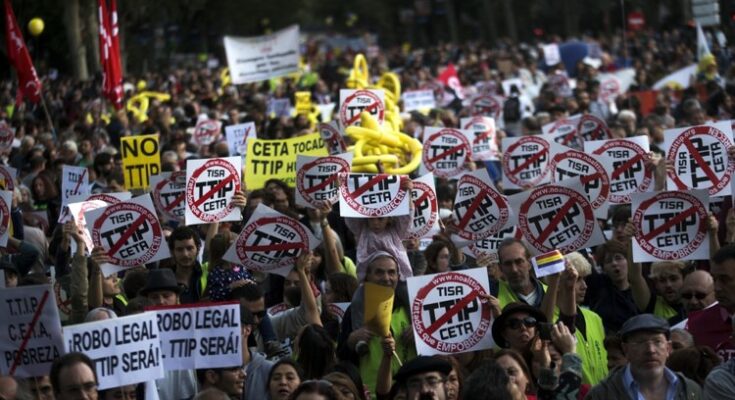- Heightened US-EU cooperation will be less about containing others than repositioning the international order around the democratic values and open market rules that have enabled Asia and the global economy to prosper
Of all the foreign policy challenges facing US President-elect Joe Biden, none will be more consequential than a revitalisation of the transatlantic partnership. One of the best ways to do that is with a massive trade deal with the European Union.
The task will not be easy, though. The United States opted for a “pivot to Asia” under former president Barack Obama, while sitting President Donald Trump’s disdain for the entire EU concept, support for Brexit and tariff war with Europe have sunk transatlantic relations to new depths. Europe would be more than justified in treading cautiously.
In the US, both major political parties remain sceptical of new trade arrangements, and some might harbour doubts the EU can even hold itself together after Brexit. In a sign of growing Euroscepticism, half of Italians told a poll in April that they wanted to leave the EU. Citizens elsewhere in Europe hold similar views.
These are not ordinary times, though. A comprehensive US-EU trade deal would go a long way in helping reset transatlantic relations when the world is desperate for new economic and moral leadership. It would also represent one of the most concrete expressions of the foreign policy vision Biden outlined during his campaign.
In numerous statements and speeches, he called for the return of democracy and human rights as a major focus of US foreign policy. In July last year, he said he would “invite my fellow democratic leaders to put strengthening democracy back on the global agenda” and has called for a global summit for democracy.
A previous attempt at a US-EU trade deal, the Transatlantic Trade and Investment Partnership (TTIP), ran out of steam at the end of the Obama administration after numerous rounds of negotiations. Whether it can be dusted off is uncertain.
What is clear is that such an agreement would reinvigorate the US economy and world trade at a time when economic stimulus is needed most. This is because of the enormous weight the two economic giants bring to the table.
The US and EU account for almost half of the global output of goods and services and just under a third of world trade. US goods exports to the EU totalled US$337 billion in 2019, a 6 per cent increase over 2018 and three times higher than US goods exported to China.
The US and EU remain each other’s primary source and destination for foreign direct investment, with roughly 50 per cent of global investment into the US coming from Europe.
In 2018, US companies created in Europe around 4.9 million jobs, while EU firms created 4.7 million jobs in the US from direct investment. American companies invest more in Ireland than in China, India, Russia, Brazil and South Africa combined. Both the US and EU markets represent the prime destination for the global export of goods and services.
A US-EU trade agreement would also bolster the new president’s goal for a foreign policy that benefits the middle class. Unlike more shallow trade agreements that focus on tariffs and trade facilitation, the US-EU variety would be deep.
For example, earlier versions of the TTIP would have lowered business costs and market access barriers by aligning American and European domestic rules and regulations, especially for small and medium-sized businesses that provide most of the jobs in the two economies.
Equally important, the new trade pact could help further open markets in Asia. Many of the region’s economies trade more with the combined transatlantic market than with any other economy, giving the US and EU leverage to achieve deeper market-opening reforms in exchange for favourable access to what would be the largest market in the world.
Its strategic significance, however, would be even more far-reaching. With the world now run by two competing models of governance – one, the transatlantic model based on democracy and free people, markets and trade, and the other mainly autocratic, state-controlled and relying on managed trade – the new US-EU trade pact could be a political driver reinforcing on a global scale many of the core values of transatlantic and other democratic societies, including those in the Indo-Pacific.
For the new Biden administration, it would mean reversing the perception that the US, Western values and global institutions are in decline. Re-energising the transatlantic alliance and creating a transatlantic marketplace would signal the West is again ready to shape the global order and that the US and Europe stand united in that effort.
Biden’s pick for secretary of state, Antony Blinken, said on CNN in October that a Biden administration would “work with our allies and partners and actually assert our values”.
As if reading from the same script, European Commission President Ursula von der Leyen recently tweeted, “A strong EU & strong US working together can shape the global agenda based on cooperation, multilateralism, solidarity and shared values.” German Foreign Minister Heiko Maas reinforced this view when he expressed his hope that “the West plays as a team again.”
While Biden’s team has called for “collective leverage” through strengthened transatlantic ties and other multilateral approaches, heightened US-EU cooperation on global issues is likely to be less about trying to contain others than repositioning the international order around the democratic values and open market rules that have enabled Asia and the global economy to prosper.
Martin Murphy is a former US diplomat and banker with 25 years’ experience in EU and Asian affairs. He is the author of Europe 1992: A Business Guide to US Government Resources
“South China Morning Post”
Martin Murphy
3 December 2020
